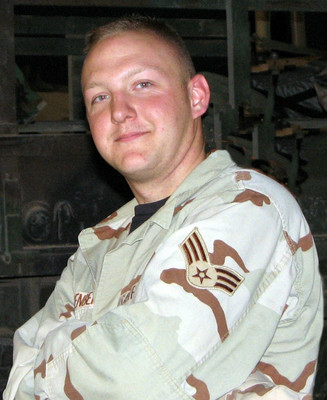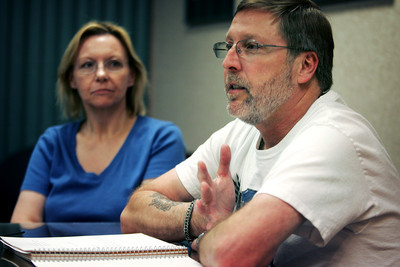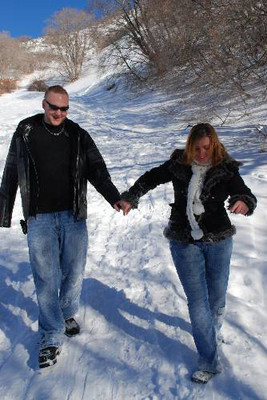Iraq vet struggled with PTSD then killed wife, himself
Long after the fire went out in Iraq, the trauma remained burned in his mind.
Senior Airman Jason Klinkenberg never got over watching his buddy burn to death on Nov. 11, 2005. That's when militants fired a rocket-propelled grenade at their convoy that hit the cab of a tank truck filled with diesel fuel.
"I went looking for the driver," Klinkenberg, 25, wrote Jan. 30 in a paper for his psychology class at the College of Southern Nevada.
"He was on fire and screaming. Just when I was about to enter the fire and try to pull Daniel "Miami" Jurn out ... the ACC (assistant convoy commander) grabbed me by the vest and said there was nothing we could do. So we stood there watching 'Miami' burn to death."
The fire was so intense it melted plastic reflectors on another truck in the 35-vehicle convoy.
When the flames subsided seven hours later, "Klink," as he was called, recovered Jurn's remains and hauled them back to their base in Balad.
Jason's parents, Art and Monette Klinkenberg of Tooele, Utah, noticed the change in their son upon his return from Iraq in early 2006.
"He couldn't enjoy the Fourth of July," Art Klinkenberg said. "Fireworks, birthday candles, the fireplace in the house. Those were all things that pretty much set him off or made him (go) back to a shell, basically, and not want to talk to anybody.
"So we looked at it kind of like he died in the same time frame (as Jurn) because he was never the same after that."
The battle stress turned tragic last February.
Three weeks after he wrote his college report, "Who Am I -- Self Biography," he shot to death his wife of 17 months, Crystal, and then turned the .38-caliber handgun on himself.
The murder-suicide unfolded Feb. 20 during a two-hour standoff with police at the couple's North Las Vegas apartment. Officers responding to a 911 call heard a struggle inside where the sound of gunfire broke the predawn silence. A SWAT team later found the couple dead in the master bedroom with the revolver at Jason's feet.
In the days that followed, his family, friends and Air Force commanders wondered what might have been done to prevent the tragedy.
Jason's family said his turmoil would have been less had his discharge not been pushed back for more than a year. He attempted suicide in October when his discharge date again was extended.
He was anxious to get out of the Air Force and get on with life, said a former noncommissioned officer who spoke on the condition of anonymity.
"After he came back from Iraq, he was kind of twitchy," he said. "You never know when that button is going to get pushed. Was he asking for help? I think he was screaming."
He said his friend "Klink" was struggling with post-traumatic stress disorder, including the nightmarish flashbacks often experienced by combat troops and first responders. It can cause sleep loss and erratic, impulsive behavior and make a person short-tempered.
PTSD-induced crime and suicide are a fast-growing problem among those who saw combat in Iraq and Afghanistan. In January, 24 soldiers committed suicide, topping the combat deaths for that month in both war zones.
Six days after Klinkenberg shot himself and his wife, U.S. Senate Veterans Affairs Committee Chairman Daniel Akaka, D-Hawaii, called for action to address the issue, saying, "The rise in active-duty suicides is one piece of a larger mental health crisis faced by service members and veterans."
Rep. Shelley Berkley, D-Nev., said a "full array of mental health services" needs to be provided to members of the armed forces and veterans suffering from PTSD.
"While they may not have been wounded by a bullet or IED, there is no denying the emotional and physical toll that PTSD has taken on Americans who experienced combat in Iraq or Afghanistan," she said.
Klinkenberg's parents said PTSD caused him to snap after he spent a night on the town with Crystal and a friend.
North Las Vegas police who investigated the murder-suicide reported that trouble began after the group had been to Stoney's Rockin' Country Bar on Las Vegas Boulevard South.
A male witness, described as Crystal's friend, said Jason "was talking to another woman and Crystal got upset. Crystal then started talking to another male at the bar. ... Jason became angry, pushed Crystal and threw her cellular phone on the floor," the police report states. Jason was escorted off the property by security.
Another friend gave Crystal and the witness a ride back to the North Las Vegas apartment where the shooting occurred. The door was locked.
"Jason arrived soon after them and let them in," the report says. "She gathered some of her belongings and left in order to avoid another argument," but she forgot something and went back to get it.
Jason locked the door, and the witness shouted, asking him to open it. But Jason yelled back, "Just go away!"
"Then he heard Crystal yell, 'He has a gun to my head! Call the police,'" the report says.
Crystal's family declined a request through Klinkenberg's parents to be interviewed for this story.
She was "the love of his life," Klinkenberg's father said. "He couldn't say nothing bad about Crystal ever."
HONORING HIS COUNTRY
As a boy, Jason took special classes to overcome speech problems. With his father in the Air Force, the family moved often.
From Kentucky to Alaska to Montana to Utah's Dugway Proving Ground, Jason lived the life of a military brat who learned how to make friends. In his own words, he "got along with everyone." He played basketball in high school and tried out for the track team to be a hurdler. He was elected treasurer of his senior class.
He decided to join the Air Force, not because his dad had served, but because he was taught to honor his country.
"I love this country, and most of all, I respect and love the U.S. flag," he wrote. "It is the whole reason I joined."
His enlistment sent him to Nellis Air Force Base as a vehicle operator for the 99th Logistics Readiness Squadron.
A car accident near Mesquite when he was returning from leave one night in 2003 left him with a serious back injury that normally would have kept him out of combat assignments. But he focused on recovery, determined to be fit when his unit got orders to deploy in 2005.
"He busted his ass to go to be with his buddies," Art Klinkenberg said. "He wanted to go. He didn't have to go."
He married Crystal in September 2007, more than a year after his Operation Iraqi Freedom tour and about the time he was beginning his battle with PTSD.
From the summer of 2007 through February of this year he made 38 visits to psychologists and psychiatrists off the Nellis base, according to payment claims filed through the military's insurance program.
He also was taking medication for back problems, which played a role in his court-martial for a minor drug offense. His father described that incident as an act of compassion by Jason to provide a painkiller, OxyContin, to a friend in need. He wasn't a drug dealer, Art Klinkenberg said.
Although he was confined for less than a month, the offense forced the Air Force to enforce a decades-old regulation that extended his discharge from January 2008 to October 2008, and then again through this year.
The delay kept him from seeking mental health care as a veteran with disability benefits through the Department of Veterans Affairs.
The stress of not being discharged with full benefits in October weighed heavily on him.
On Oct. 20, North Las Vegas police responded to a suicide attempt. Jason's father did not have details of the incident but said his son was taken to the base hospital. Police did not confiscate the gun he had in the apartment because no crime had been committed, the father said.
"And this is where the problem all begins," Art Klinkenberg said. "They just wanted to medicate him, put him in a zombie state. And he refused the medication."
After a couple of days, he was transferred to a hospital "somewhere in Las Vegas," Art Klinkenberg said.
"He was there for a week, obviously not long enough. And then he went back to work, and pretty much nothing was done about it.
"That's where the ball dropped, I think," he said. "I don't want to say anything bad about the Air Force. ... I don't want to point fingers because too many balls were dropped and basically it's too late. Jason can't be brought back, and neither can Crystal."
Col. David Belote, commander of the 99th Air Base Wing at Nellis, said Thursday that he couldn't comment on "whether the Air Force dropped the ball."
He said Jason Klinkenberg's discharge decision was up to the Secretary of the Air Force Personnel Council.
"As wing commander, even the general officers in the chain of command are not empowered to deal with those particular situations. That is reviewed in Washington, D.C.," he said.
The council, Belote said, decides whether to grant a disability rating and either medically retire an airman with a disability, or decide if the "misbehavior was unrelated to the condition." In the latter case, an airman might receive a general discharge and would be eligible for fewer benefits.
Belote speculated that a decision in Jason's case would have been made in "some number of weeks."
"It does take months, and we were working toward the end of that process when airman Klinkenberg killed himself," he said.
"I will certainly admit that a bureaucratic process, which has been in existence for quite some time and designed to enforce a zero tolerance policy on drug abuse ... was not as agile as we would have hoped to be in this particular case."
The bottom line, he said, is "the Air Force tried to reach out."
"We tried, and we're going to continue to work to make sure that nobody falls through the cracks, and if we can learn anything, publicly or privately, from airman Klinkenberg's case, we will reinvest in the United States Air Force and in the military and prevent something like this from happening again," Belote said.
A local veterans advocate, Johnathan Abbinett, a Vietnam veteran, underwent years of therapy for his PTSD. He predicts there will be a flood of cases because of the strain of multiple deployments on soldiers, sailors, Marines and airmen, and the nature of the war on terrorism.
"There's a nightmare that's about to unfold in the next 10, 20, 30, 40 years," Abbinett said, "and it's going to make the Vietnam veterans' generation pale in comparison."
Contact reporter Keith Rogers at krogers @reviewjournal.com or 702-383-0308.
Video
Read Klinkenberg's "Who I Am -- Self-Biography"
War Back Home
Las Vegas Review-Journal series on post-traumatic stress disorder




















